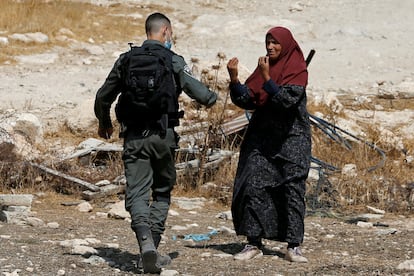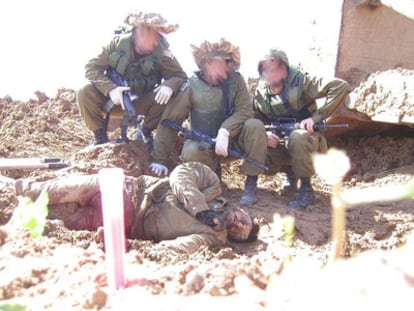Sobering Israeli documentary voices opposition to the occupation of Palestine
Former soldiers describe long-running abuses of Palestinians since their nation’s victory in the 1967 Arab–Israeli War

The bad thing about building high walls is that you can’t see what’s behind them. This might be a good thing for the Israelis who built the walls because they could ignore those on the other side. However, there’s a conflict that can’t be ignored just because it isn’t visible. People who show compassion for the Palestinians are often accused of supporting Hamas terrorism, but there are many Israelis rebelling against the mistreatment of their neighbors.
The First 54 Years: An Abbreviated Manual for Military Occupation is a documentary made by Avi Mograbi in 2021 presenting Israelis — many of them former soldiers — expressing shame for what they did in Palestinian lands. The documentary includes interviews and footage of the abuses against Palestinians in the West Bank and Gaza in the 54 years since the 1967 Arab-Israeli War. The documentary had more impact abroad than in Israel, says Mograbi, who coldly and somewhat sarcastically dismantled the logic of those who planned the occupation. Their intent all along was to appropriate land, eliminate any possibility of an independent Palestinian state, and destroy the social fabric of the occupied territories.
Most of the former Israeli soldiers who appear in the film collaborated with Breaking the Silence, an organization of veterans who have served in the Israeli military since the start of the Second Intifada. The organization’s stated mission is “to break the silence” surrounding military activities and human rights abuses in the occupied territories. The documentary includes accounts of avoidable shootings and gunfire, with one soldier comparing the experience to a video game. Images of soldiers posing for photos with the corpses of Palestinians they killed, like hunting trophies. Reports of arbitrary arrests, prisoner beatings, home demolitions, and illegal land seizures.

Mograbi sometimes focuses unnecessarily on the deliberate harassment of Palestinians. There’s a story about an old man finding an Israeli military camp that sprang up overnight on his farm. Or the children pulled out of bed at dawn with their parents to have their photos taken. A carpenter and his apprentice were tied to a tree all night for no apparent reason. People given an hour or two to collect their belonging and leave homes scheduled for demolition. The innumerable checkpoints that prevent Palestinians from moving freely around a West Bank riddled with illegal Israeli settlements.
Spanning over half a century, this story takes us through moments of relative calm and intense tension. From the Intifadas to the Oslo Accords, we witness the establishment of a handcuffed Palestinian National Authority, the expansion of Israeli settlements, and the suffocating blockade of Gaza since 2007. One particularly striking testimony reveals that Israeli military orders often say nothing about avoiding civilian casualties. Instead, “clean sweep” is the euphemism used to encourage ruthlessness. The dehumanization of Palestinians has deepened significantly since the Hamas attack on October 7, with Israel’s defense minister threatening to bomb the “human animals” into oblivion.
The current conflict has deep-seated roots that cannot be ignored, as Secretary-General António Guterres noted recently at the United Nations. Decades of pent-up resentment have brought us to this point. Mograbi represents the once-influential pacifist left in Israel that now struggles to be heard. However utopian and out of reach it may seem, a two-state solution remains the only viable way out of this chaos and violence. Another negative consequence of building walls is that taking them down can be very difficult.
Sign up for our weekly newsletter to get more English-language news coverage from EL PAÍS USA Edition
Tu suscripción se está usando en otro dispositivo
¿Quieres añadir otro usuario a tu suscripción?
Si continúas leyendo en este dispositivo, no se podrá leer en el otro.
FlechaTu suscripción se está usando en otro dispositivo y solo puedes acceder a EL PAÍS desde un dispositivo a la vez.
Si quieres compartir tu cuenta, cambia tu suscripción a la modalidad Premium, así podrás añadir otro usuario. Cada uno accederá con su propia cuenta de email, lo que os permitirá personalizar vuestra experiencia en EL PAÍS.
¿Tienes una suscripción de empresa? Accede aquí para contratar más cuentas.
En el caso de no saber quién está usando tu cuenta, te recomendamos cambiar tu contraseña aquí.
Si decides continuar compartiendo tu cuenta, este mensaje se mostrará en tu dispositivo y en el de la otra persona que está usando tu cuenta de forma indefinida, afectando a tu experiencia de lectura. Puedes consultar aquí los términos y condiciones de la suscripción digital.









































